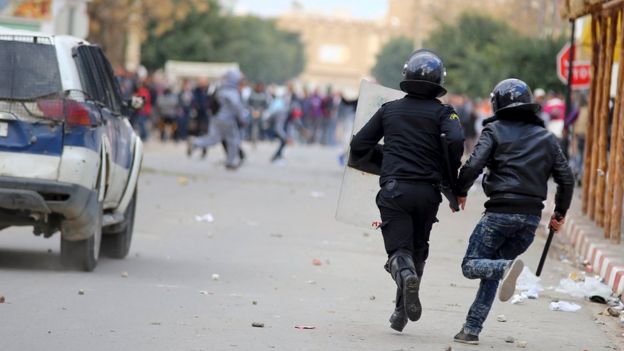 EPA
EPA
Protests over youth unemployment have spread to several towns and cities in Tunisia, leading to the death of a policeman in clashes on Thursday.
Demonstrations began in the northern Kasserine region after a man was electrocuted while protesting at being rejected for a government job.
In the town of Feriana, a policeman died after his car was overturned.
Unemployment has worsened since the 2011 revolution, when President Zine al-Abidine Ben Ali was ousted.
The revolution was triggered by struggling market stall owner Mohamed Bouazizikilling himself in Sidi Bouzid.
Some of those demonstrating this week said many of the social problems highlighted in 2011 had not been resolved.
More than a third of young people are unemployed, with 62% of Tunisian graduates without work according to the OECD.
"We have been waiting for things to get better for five years and nothing has happened," Yassine Kahlaoui, a 30-year-old jobseeker, told the Associated Press in Kasserine, where police fired tear gas at demonstrators near government buildings.
"We're tired of broken promises," he added.
 Reuters
Reuters
Elsewhere in Tunisia
- Demonstrators cut off all roads to Sidi Bouzid, according to AFP news agency
- The interior ministry said 59 officers were hurt on Thursday
- Medical officials told AP some 40 demonstrators were injured
- Hundreds of people marched in the capital, Tunis, to demand work
- A police station in the southern town of Guebeli was set alight, and a police post in Kef, in the north, abandoned, Reuters news agency reports
President Beji Caid Essebsi said on Wednesday that more than 6,000 jobs would be given to people from Kasserine. The government also promised an investigation into allegations of corruption.
Meanwhile, the office of Prime Minister Habib Essid said he was to return home early from the World Economic Forum in Davos, and would visit Kasserine on Saturday.
Unemployment was a major problem affecting Tunisia, Mr Essid said in a speech in Davos on Thursday, adding "we do not have a magic wand to end it in a short period of time".
CREDIT: BBC





No comments:
Post a Comment